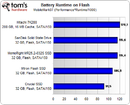Wednesday, July 2nd 2008
SSDs Don't Reduce Power-consumption, they Increase it
And you thought your solid-state hard-drive (SSD) increased your laptop's battery life? Think again. In a new article, Tom's Hardware investigated the possibility that SSDs in fact increase power consumption of the system, and the results were astonishing.
While a conventional hard-drive idles at 0.5W to 1.3W, it's only during heavy-duty as in lots of random-access, when the actuator moves the heads back and forth that the drive could peak at up to 4W. NAND Flash based SSDs only know two power states, 'idle' and 'active', SSDs from some vendors don't even feature these. While power consumption of conventional drives are proportional to their form-factor since it affects the weight of the platter(s) and effectively the load on the motor, with SSDs, form factor doesn't affect consumption, and a 1.8" SSD could have higher idle consumption than its conventional counterpart.
You can read the article here.
Source:
Tom's Hardware
While a conventional hard-drive idles at 0.5W to 1.3W, it's only during heavy-duty as in lots of random-access, when the actuator moves the heads back and forth that the drive could peak at up to 4W. NAND Flash based SSDs only know two power states, 'idle' and 'active', SSDs from some vendors don't even feature these. While power consumption of conventional drives are proportional to their form-factor since it affects the weight of the platter(s) and effectively the load on the motor, with SSDs, form factor doesn't affect consumption, and a 1.8" SSD could have higher idle consumption than its conventional counterpart.
You can read the article here.

15 Comments on SSDs Don't Reduce Power-consumption, they Increase it
But I dont agree with the analysis. They used "mobilemark" as the denominator in their statistics... which is completely arbitrary.
IMO this is the relevant chart:
If your laptop/PC is sitting there inactive at the desktop, then you WILL get a lot more battery life with the Sandisk and Memoright.
But if you have a Mtron, your laptop battery will not last as long.
BUT
If you consider the #data transactions / power then SSD wins. You battery might not last as long... but in the time you've got... you will get a lot more done, even with the Mtron.
And the SSDs acess time "is ~0ms" , transfer rate is bigger too
Consider that a spinning disk should use very little power to keep spinning - the biggest power is required to spin up the disk from a power down condition. The seek head motion is a tiny part of the drive power consumption.
However - the flash chips use the same off-on power each time data is accessed - The entire 32GB of chips must energize when seeking - as the array has no idea where data shall be retrieved. Although the power to energize the array may be significantly less than the spin up power of a disc - the number of these chip array power cycles is probably 1,000,000X greater during this benchmark test. Pls advise if this logic is incorrect.
This MobileMark test clearly indicates the SSD technology is still in its infancy!
Another thing not to buy before reading reviews / user input :)
obviously, SSD's are there for noise and speed, not power saving.
That said... did they test the say, 8GB models in the macbook air? i'm sure this varies a lot between types of SSD's.
(as an example for how this could be flawed: if i was watching a movie, the SSD would load it a lot faster and therefore be on less often. it would spend more time in the idle state, so this problem could in fact not exist in the real world)